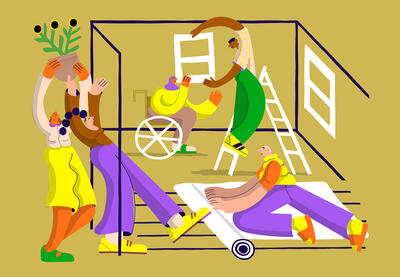“What’s this CPR thing that my child keeps talking about?” a parent asked on family night as others nodded in agreement. Apparently, my students had enthusiastically talked about the acronym without much explanation. I smiled as I explained to my fifth graders’ parents and caregivers about my classroom practice of the Circle of Power and Respect (CPR).
The Morning Meeting Book by Roxann Kriete and Carol Davis provided the idea for the CPR model, and I was heartened to know that my first time implementing the practice had resonated with my students. When I could squeeze it into our packed schedule, we would circle up and engage in intentional relationship-building. This practice helped me better understand and appreciate my students, and it helped them connect with one another in a more meaningful and structured way. Sadly, because of time constraints, CPR was not as consistent as I, or the students, would have liked.
The importance of intentionally building and sustaining relationships has stayed with me and been reinforced over the years since I transitioned from classroom teaching.
When I first arrived at the SPLC’s Learning for Justice—then Teaching Tolerance—program, I was welcomed with a small handmade banner created from construction paper that was hanging on my desk, and various coworkers invited me to lunch and dinner to help me get better acquainted with a new team and a new town. The time intentionally created for me to learn, ask questions and get to know my new teammates helped me adjust and feel connected.
Later, I was managing the process of creating new in-person learning experiences for educators. Val Brown, our first trainer and eventual professional development manager, was clear from the beginning about the importance of embedding relationship-building throughout every workshop we planned. She would gently remind us that “time spent building community is never time wasted.” In practice, the often-dreaded generic workshop icebreaker was transformed into an amazing practice that provided space for connection and learning.
As the COVID-19 pandemic forced us to become an all-remote organization almost overnight, our team encountered disagreements. I came to understand that, while we liked one another, these challenges were more productively navigated when those involved had developed and sustained relationships. I also came to realize that as a manager I had dropped the ball at times by not ensuring intentional and sustained relationship-building was happening.
People across various sectors—including educators and activists—have struggled with these issues over the last few years. And while I am still learning, I have a list of reminders that help keep relationship-building a focus of my practice.
- Relationship-building is planned and intentional. Just thinking folks will come together and bond does not happen without thoughtful planning.
- It is consistent and sustained. Relationships that help folks navigate challenges need time. Planning ongoing avenues of engagement will help support stronger relationships.
- It is fun and celebratory. Folks will be more engaged if the time is enjoyable and does not feel like a chore. Also, celebrating work and non-work-related milestones is important.
- It starts small and builds. Brief, consistent types of engagements can go a long way. A simple and fun opening question—one that doesn’t require too much vulnerability—to start off meetings can lead to interesting insights. Once this structure is in place, asking folks as they are comfortable to be more vulnerable can happen over time.
- It is transparent. The group clearly knows the purpose and how it is part of and not separate from their work. Transparency—letting folks know why they are doing something—can build stronger relationships, as can providing space for feedback.
- Relationship-building is a group effort. I have learned the hard way that it’s more effective and fun when folks have input into planning and sustaining relationship-building efforts.
My commitment stays strong because I am part of an incredible team of activists and educators who know that this work begins and ends with relationship. I have witnessed firsthand how grace is extended, conversations are engaged in more deeply, and change is enacted when individuals have a history of building and sustaining relationships with one another. We cannot achieve the vision for our communities and ourselves if we do not truly relate to and connect with one another in an authentic way.
